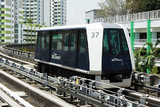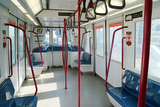Difference between revisions of "Mitsubishi Heavy Industries 810"
m (Removed protection from "Mitsubishi Heavy Industries C810") |
m |
||
| Line 26: | Line 26: | ||
===Cracks=== | ===Cracks=== | ||
On 9 September 2016, SBS Transit has announced that 11 trains had hairline cracks.<ref name=STCrack>[//www.straitstimes.com/singapore/transport/hairline-cracks-found-on-11-sengkang-punggol-lrt-trains "Hairline cracks found on 11 Sengkang-Punggol LRT trains"] The Straits Times (9 September 2016).</ref> This is barely 2 months after announcements that cracks were found in [[Kawasaki Heavy Industries & CSR Qingdao Sifang C151A|C151A]] and subsequently [[ | On 9 September 2016, SBS Transit has announced that 11 trains had hairline cracks.<ref name=STCrack>[//www.straitstimes.com/singapore/transport/hairline-cracks-found-on-11-sengkang-punggol-lrt-trains "Hairline cracks found on 11 Sengkang-Punggol LRT trains"] The Straits Times (9 September 2016).</ref> This is barely 2 months after announcements that cracks were found in [[Kawasaki Heavy Industries & CSR Qingdao Sifang C151A|C151A]] and subsequently [[Adtranz C801|C801]] trains. All trains had their bogie frames replaced and strengthened to prevent similar incidents from happening again. | ||
==Design/Features== | ==Design/Features== | ||
Revision as of 09:49, 21 April 2022
Mitsubishi Heavy Industries C810 are the first generation of trains running on the Sengkang LRT and the Punggol LRT.
History
Between 2013 and 2015, 16 train cars were modified to be coupled for 2-car operations. Modifications are required to the signalling system and trains for dual-car service. Two seats from both ends of the train car were replaced with a signalling box, housing the new signalling equipment. The dual-car train system was commissioned for revenue service in 2015.
Cracks
On 9 September 2016, SBS Transit has announced that 11 trains had hairline cracks.[1] This is barely 2 months after announcements that cracks were found in C151A and subsequently C801 trains. All trains had their bogie frames replaced and strengthened to prevent similar incidents from happening again.
Design/Features
| Initial | ||
|---|---|---|
M
| ||
| Exterior Design | ||
| Livery | Navel Blue | |
| Train Run Number | N/A | |
| Interior Design | ||
| Seating Capacity | Original | Modified |
| 18 | 14 | |
| Wheelchair Bay | N/A | |
| Door Closing Indicator Lights | N/A | |
| System | ||
| Safety System | ATC, ATO, ATP, ATS | |
| Signalling System | Fixed Block | |
| Traction Control | IGBT-VVVF (Mitsubishi) | |
Fleet Numbering
The car numbers of the trains range from 01 to 41.
References
- ↑ "Hairline cracks found on 11 Sengkang-Punggol LRT trains" The Straits Times (9 September 2016).
| [ V • T • E ] | ||
|---|---|---|
| Overview | History • Stations • Fare and Ticketing • Facilities • Safety • Security | |
| Lines | Bukit Panjang LRT • Sengkang LRT • Punggol LRT | |
| Rolling Stocks | 801 • 801A • 801B • 810 • 810A | |
| Future810D | ||
| Depots | Sengkang • Ten Mile Junction | |
| [ V • T • E ] | ||
|---|---|---|
| Stations | Sengkang | |
| East LoopCompassvale • Rumbia • Bakau • Kangkar • Ranggung | ||
| West LoopCheng Lim • Farmway • Kupang • Thanggam • Fernvale • Layar • Tongkang • Renjong | ||
| Rolling Stock | 810 • 810A • 810D | |
| Depots | Sengkang | |
| Others | Bridging Service | |
| [ V • T • E ] | ||
|---|---|---|
| Stations | Punggol | |
| East LoopCove • Meridian • Coral Edge • Riviera • Kadaloor • Oasis • Damai | ||
| West LoopSam Kee • Teck Lee • Punggol Point • Samudera • Nibong • Sumang • Soo Teck | ||
| Rolling Stock | 810 • 810A • 810D | |
| Depots | Sengkang | |
| Others | Bridging Service | |

